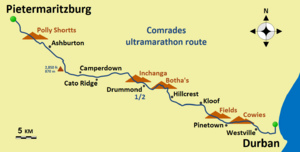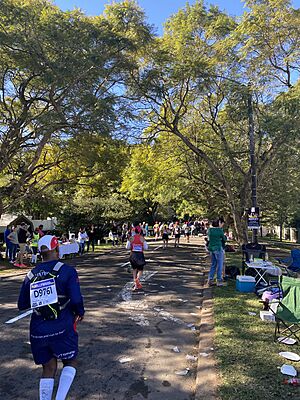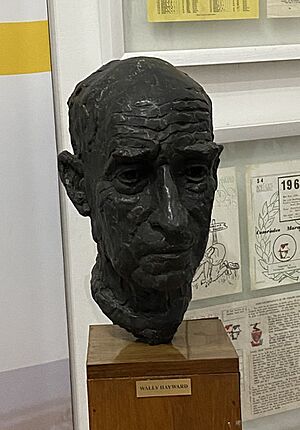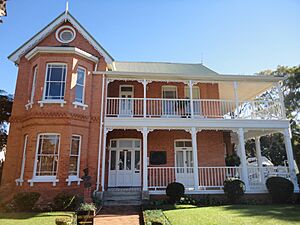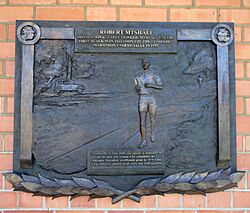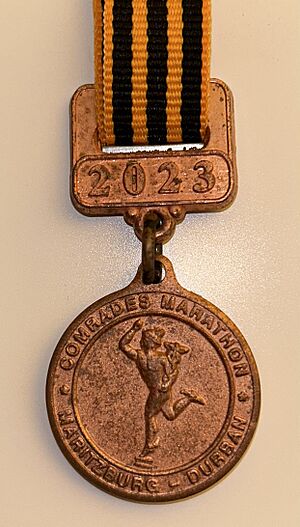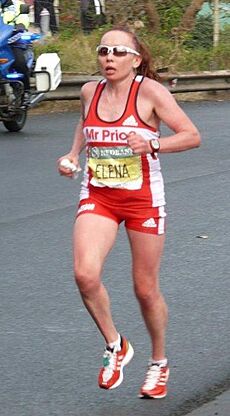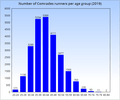Comrades Marathon facts for kids
Quick facts for kids Comrades Marathon |
|
|---|---|
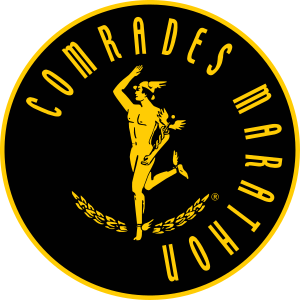
The Comrades Marathon logo
|
|
| Date | May / June |
| Location | Durban / Pietermaritzburg, South Africa |
| Event type | Road |
| Distance | Ultramarathon (90 km) |
| Established | 1921 |
| Course records |
|
| Official site | The Comrades Marathon |
The Comrades Marathon is a super long-distance running race, about 88 kilometres (55 miles) long. It happens every year in the KwaZulu-Natal province of South Africa. The race runs between the cities of Durban and Pietermaritzburg. It's known as the world's biggest and oldest ultramarathon. The race direction changes each year. Sometimes it's an "up" run, starting in Durban and going uphill. Other times, it's a "down" run, starting in Pietermaritzburg and going mostly downhill.
Since 1988, more than 10,000 runners have finished the race almost every year. They have to complete it within 11 or 12 hours. Over the years, more people have joined, and the average age of runners has also increased.
Contents
The Comrades Marathon Route
The Comrades Marathon takes place on the roads of KwaZulu-Natal province. It connects the cities of Durban and Pietermaritzburg. The route changes direction each year. It's famous for its five big hills, often called the “Big Five.” These are Cowies Hill, Fields Hill, Botha's Hill, Inchanga, and Polly Shortts. These hills are different in length and steepness. They are important parts of the race, no matter which way you run.
The highest point on the course is near Umlaas Road. It's about 870 metres (2,850 feet) above sea level. Along the way, there are about 40 official stations. These stations offer water, energy drinks, fruit, and snacks. They also have first aid and physiotherapy to help runners.
The 'Up' Run Challenge
In an "up" run year, the Comrades Marathon starts in Durban on the coast. It finishes in the inland city of Pietermaritzburg. This route is about 87 kilometres (54 miles) long. Runners gain over 1,800 metres (5,900 feet) in height. The first part of the race has the most climbing. Runners go up more than 500 metres (1,640 feet) in the first 22 kilometres (13.7 miles). The race starts with a slow climb out of Durban. Then runners face the first of the "Big Five" hills.
Cowies, Fields, and Botha’s Hills are in the first half of the race. Runners need to save their energy here. After the halfway point near Drummond, the course continues to go up and down. Inchanga is a long, winding climb that tests runners' strength. The highest point is at Umlaas Road. Then the route drops a bit before the very steep climb of Polly Shortts. This hill is in the last 10 kilometres (6.2 miles). Polly Shortts is shorter than other hills but very steep. It often decides the race because runners are very tired by then. The final part into Pietermaritzburg has smaller climbs before the finish line.
The 'Down' Run Challenge
In a "down" run year, the Comrades Marathon is about 90 kilometres (56 miles) long. It starts in Pietermaritzburg and goes to Durban. The race goes from about 660 metres (2,165 feet) above sea level down to almost sea level. Even though it's called a "down" run, there are still many climbs and dips. From the start at Pietermaritzburg City Hall, runners climb gently. Then they face early challenges like Polly Shortts and Little Polly’s. The route then goes up to Umlaas Road, the highest point. After that, it goes downhill through Camperdown and Cato Ridge.
The second half of the race includes a long downhill from Inchanga to Drummond (the halfway point). Then there's a climb through Alverstone and Botha’s Hill. Fields Hill is a very steep and long downhill into Pinetown. Cowies Hill comes shortly after. These downhill parts can be hard on runners' leg muscles. After going through Westville, runners head towards Durban. They finish outside the Moses Mabhida Stadium. Even though it's a "down" run, runners need to pace themselves carefully. Late climbs and the overall impact can make a big difference.
History of the Comrades Marathon
The Comrades Marathon was first held on 24 May 1921. It is one of the oldest and most respected ultramarathons in the world. A soldier from World War I, Vic Clapham, created the race. He wanted it to honour soldiers who had died. He also wanted it to be a test of how strong and determined people could be.
The race has happened every year, except for short breaks during World War II and the COVID-19 pandemic (2020–2021). More than 300,000 runners have completed the course.
In the early years, many runners achieved great things. Bill Rowan won the first race in 1921. Arthur Newton won five times in the 1920s. Women like Frances Hayward ran in 1923, even though they weren't officially allowed yet. The 1930s saw runners like Hardy Ballington and Wally Hayward. Wally Hayward continued to run and became the oldest finisher at age 80 in 1989.
In the 1940s, traditions like Max Trimborn’s rooster crow started. This crow replaced the starting gun and is still part of the race today.
From the 1960s to the 1980s, the Comrades grew a lot. International runners could join. In 1975, black runners and women were officially welcomed. Vincent Rakabaele was the first black runner to officially win a medal. Elizabeth Cavanaugh was the first official women's winner. Bruce Fordyce won nine titles, and Frith van der Merwe set an amazing women's record in 1989. The 1980s also saw black champions like Sam Tshabalala. Television started showing the race, and more people joined. This made the race very famous.
In the 1990s and 2000s, the Comrades became even more global. Prize money was added in 1995, attracting top international athletes. The race date changed to Youth Day, showing South Africa’s new political situation. In 2000, nearly 24,000 people entered for the 75th anniversary. In 2010, the race set a Guinness World Record for the most finishers in an ultramarathon. Runners like Leonid Shvetsov (2007 & 2008) and David Gatebe (2016) set new course records. Athletes like Stephen Muzhingi and the Russian twin sisters Olesya and Elena Nurgalieva won many races. The sisters won 10 races between them.
After a break in 2020 and 2021 due to COVID-19, the Comrades returned in 2022. Recent years have seen athletes like Gerda Steyn and Tete Dijana win multiple times.
Rules for Runners
To run the Comrades Marathon, you must be over 20 years old. You also need to have finished an official marathon (42.2 km or 26.2 miles) in under 4 hours and 50 minutes. During the race, runners must reach five special checkpoints by certain times. If they don't, they have to stop.
Runners have 12 hours to complete the course. This time limit was changed from 11 hours in 2003. The very first Comrades races (1921-1927) also had a 12-hour limit.
Runners who have finished nine Comrades Marathons wear a yellow number. Those who have finished ten races get a special green number. This green number is theirs forever for all future races. Runners doing their 20th, 30th, or 40th races also get special yellow numbers.
Comrades Marathon Medals
All runners who finish the race in under 12 hours receive a medal. Different medals are given based on how fast a runner finishes:
| Medal | Time Range / Criteria | Design | Notes |
|---|---|---|---|
| Gold | Top 10 men and top 10 women | Solid gold-coloured | Given to the first ten finishers in each gender. |
| Wally Hayward | 11th place to under 6:00 (men only) | Silver centre with gold ring | Named after five-time winner Wally Hayward. |
| Isavel Roche-Kelly | 11th place to under 7:00 (women only) | Silver centre with gold ring | Named after the first woman to finish under 7 hours 30 minutes. |
| Silver | 6:00 to under 7:30 (men); also 7:00 to under 7:30 for women | Solid silver-coloured | For runners just outside the top elite group. |
| Bill Rowan | 7:30 to under 9:00 | Bronze centre with silver ring | Named after Bill Rowan, the first winner in 1921. |
| Robert Mtshali | 9:00 to under 10:00 | Titanium | Honours Robert Mtshali, an early black participant. |
| Bronze | 10:00 to under 11:00 | Solid bronze-coloured | A common medal for those finishing well within the time limit. |
| Vic Clapham | 11:00 to under 12:00 | Copper | Named after the race founder, Vic Clapham. |
| Back-to-Back | For novices who complete their second race in a row | Dual medal design | For runners who finish an 'up' and 'down' run in back-to-back years. |
Comrades Marathon Traditions
The Comrades Marathon has many old traditions that make it special. One main tradition is that the race direction changes every year. It's either an “up” run or a “down” run. Each direction has its own tough challenges.
At the start line, a special sequence happens. First, the South African National Anthem is played. Then, the song Shosholoza is sung. After that, Chariots of Fire by Vangelis is played. A recording of Max Trimborn’s famous rooster crow is played. Finally, the starting gun fires.
About halfway through the race, runners pass Arthur’s Seat near Drummond. This is a small spot where five-time winner Arthur Newton supposedly rested. It's a tradition to say hello to "Arthur" or leave a flower there. People believe it brings good luck for the rest of the race.
As runners enter the final stretch, the leading man and woman receive a special scroll. This scroll has a message of goodwill from the mayor of the starting city to the mayor of the finishing city. It shows the connection between Durban and Pietermaritzburg. Also, the top 10 male and female finishers each get a red rose as they cross the finish line.
At the end, the 12-hour cutoff time is very strict. A gun fires exactly at the time limit. Runners who haven't finished by then are not counted as official finishers. Right after, a bugler plays The Last Post. This marks the end of the event.
Comrades Marathon Results
The Comrades Marathon has a long history of amazing endurance running. Bill Rowan won the first race in 1921. Arthur Newton was very strong in the 1920s, winning five times. Wally Hayward and Bruce Fordyce became huge names. Hayward won five times between the 1930s and 1950s. Fordyce won an incredible nine times in the 1980s. The women’s race officially started in 1975. Frith van der Merwe set a fantastic record of 5:54:43 in 1989, which stood for many years. In the 2000s, Russian athletes Elena and Olesya Nurgalieva were very dominant. They won most of the women's races from 2003 to 2015.
From 2014 onwards, South African athletes started winning more often. Bongmusa Mthembu won three titles. David Gatebe set the men’s down run record of 5:18:19 in 2016. Gerda Steyn has become the top female runner. She broke the down run record in 2023 (5:44:54) and the up run record in 2024 (5:49:46). For the men, Tete Dijana broke the down run record in 2023 when he won his second race. Dutch runner Piet Wiersma won in 2024. The 2025 down run was won by Tete Dijana (5:25:28) and Gerda Steyn (5:51:19).
Today, Bruce Fordyce holds the record for the most men's victories with nine wins. Elena Nurgalieva has the most women's wins with eight.
Records and Statistics
The fastest times ever recorded in the Comrades Marathon are:
- Men: 5:13:58 by Tete Dijana in the 2023 down run.
- Women: 5:44:54 by Gerda Steyn in the 2023 down run.
Gerda Steyn also holds the up-run record, being the first woman to finish in under 6 hours with her time of 5:49:46 in 2024.
Elena Nurgalieva has won the most gold medals in the women's race, with 13. Allan Robb leads the men's race with 12 gold medals.
The race also celebrates runners who show amazing endurance over many years. Louis Massyn has completed 50 Comrades Marathons, which is the most in history. In 2023, Johannes Maros Mosehla became the oldest known finisher at age 81. He extended this record in 2024 and 2025. He beat the record held by Wally Hayward, who finished the race at age 80 in 1989.
Images for kids
See also
 In Spanish: Maratón Comrades para niños
In Spanish: Maratón Comrades para niños
 | Dorothy Vaughan |
 | Charles Henry Turner |
 | Hildrus Poindexter |
 | Henry Cecil McBay |


